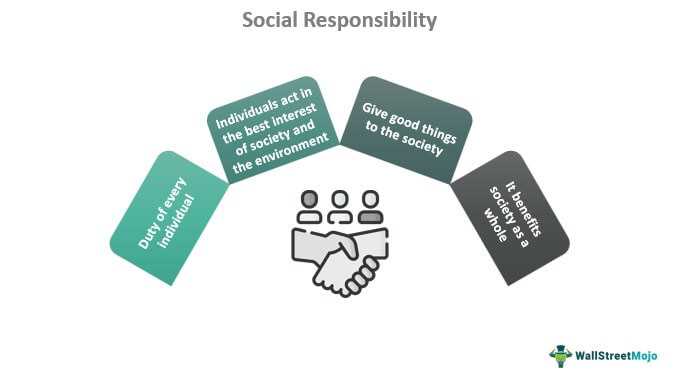Exploring the Meaning and Importance of Social Responsibility in Business

Social responsibility in business refers to the ethical and moral obligations that a company has towards society and the environment. It is the recognition that businesses have a broader impact beyond their financial performance and shareholder value. Social responsibility encompasses the actions and initiatives taken by businesses to contribute positively to society, protect the environment, and address social issues.
Meaning of Social Responsibility

The meaning of social responsibility in business goes beyond simply complying with laws and regulations. It involves actively seeking ways to make a positive impact on society and the environment. This includes considering the interests of various stakeholders such as employees, customers, communities, and the environment in business decision-making processes.
Businesses that embrace social responsibility understand that their actions can have far-reaching consequences. They strive to operate in an ethical and sustainable manner, taking into account the long-term impact of their decisions on society and the environment.
Importance of Social Responsibility
Social responsibility is important for several reasons. Firstly, it helps businesses build a positive reputation and enhance their brand image. Consumers are increasingly conscious of the social and environmental impact of the products and services they purchase. By demonstrating a commitment to social responsibility, businesses can attract and retain customers who align with their values.
Secondly, social responsibility can improve employee morale and engagement. When employees feel that their company is making a positive impact on society, they are more likely to be motivated and proud of their work. This can lead to increased productivity and loyalty among employees.
Furthermore, social responsibility can contribute to the long-term sustainability of businesses. By addressing social and environmental issues, companies can mitigate risks and adapt to changing societal expectations. This can help them stay competitive and relevant in an ever-evolving business landscape.
Lastly, social responsibility is important for the overall well-being of society and the planet. Businesses have the resources and influence to make a significant difference in addressing social and environmental challenges. By actively participating in initiatives that promote social responsibility, businesses can contribute to the betterment of society and create a more sustainable future.
Examining the Different Types of Social Responsibility
1. Environmental Responsibility:
Environmental responsibility refers to a business’s commitment to minimizing its negative impact on the environment. This can include implementing sustainable practices, reducing carbon emissions, conserving resources, and promoting recycling and waste reduction.
2. Ethical Responsibility:
Ethical responsibility involves conducting business in an ethical and morally upright manner. This includes treating employees, customers, and stakeholders with fairness and respect, adhering to ethical business practices, and avoiding any form of discrimination, corruption, or exploitation.
3. Philanthropic Responsibility:
Philanthropic responsibility involves giving back to society through charitable donations, volunteer work, and community development initiatives. This type of social responsibility aims to improve the well-being of communities and address social issues such as poverty, education, healthcare, and cultural preservation.
4. Economic Responsibility:
Economic responsibility refers to a business’s commitment to contributing to the economic development and stability of society. This includes creating jobs, paying fair wages, supporting local suppliers and businesses, and contributing to the overall economic growth of the community.
Legal responsibility entails complying with all applicable laws and regulations. Businesses have a responsibility to operate within the legal framework of the countries in which they operate, ensuring that their practices and products meet all necessary legal requirements.
6. Stakeholder Responsibility:
Stakeholder responsibility involves considering the interests and needs of all stakeholders, including employees, customers, suppliers, shareholders, and the wider community. Businesses should strive to create value for all stakeholders and engage in transparent and open communication.
Social Responsibility in Business: Real-World Examples
1. Patagonia
Patagonia, an outdoor clothing company, is known for its commitment to environmental sustainability. The company has implemented various initiatives to reduce its carbon footprint, such as using recycled materials in its products and investing in renewable energy sources. Patagonia also encourages its customers to repair their clothing instead of buying new ones, promoting a culture of reuse and reducing waste.
2. Ben & Jerry’s
Ben & Jerry’s, an ice cream company, is a prime example of social responsibility in business. The company is known for its dedication to social and environmental causes. Ben & Jerry’s sources its ingredients from fair trade suppliers, ensuring that farmers receive fair wages and working conditions. The company also actively supports various social justice issues, such as marriage equality and climate change.
3. Microsoft

Microsoft, a technology company, has made significant efforts to promote social responsibility. The company has implemented various initiatives to bridge the digital divide and provide access to technology for underprivileged communities. Microsoft also focuses on environmental sustainability, aiming to be carbon negative by 2030 and to remove all the carbon it has emitted since its founding by 2050.
4. Starbucks
Starbucks, a global coffee chain, is committed to social responsibility and sustainability. The company has set ambitious goals to reduce its environmental impact, such as minimizing water usage and increasing recycling rates. Starbucks also prioritizes ethical sourcing, ensuring that its coffee beans are sourced from farmers who are paid fair wages and work under safe conditions.
5. TOMS
TOMS, a shoe and eyewear company, has a unique business model that incorporates social responsibility. For every pair of shoes or eyewear purchased, TOMS donates a pair to a person in need. This “One for One” model has had a significant impact, providing shoes and eyewear to millions of people around the world who would otherwise not have access to them.
| Company | Initiatives |
|---|---|
| Patagonia | Environmental sustainability, promoting reuse |
| Ben & Jerry’s | Fair trade sourcing, supporting social justice issues |
| Microsoft | Bridging the digital divide, environmental sustainability |
| Starbucks | Environmental impact reduction, ethical sourcing |
| TOMS | “One for One” model, providing shoes and eyewear to those in need |
These examples demonstrate that social responsibility can take various forms and be integrated into different aspects of business operations. By prioritizing social and environmental issues, companies can make a positive impact on society while also benefiting their bottom line.
Highlighting Successful Implementations of Social Responsibility in Business
Implementing social responsibility initiatives in business can have a significant impact on both the company and society as a whole. Many companies have successfully integrated social responsibility into their business practices, leading to positive outcomes for various stakeholders.
One notable example is Patagonia, an outdoor clothing and gear company. Patagonia has been a pioneer in sustainable business practices, focusing on reducing its environmental footprint and promoting fair labor practices. The company has implemented initiatives such as using recycled materials in their products, offering repair services to extend the lifespan of their clothing, and donating a portion of their sales to environmental causes. These efforts have not only earned Patagonia a loyal customer base but also positioned them as a leader in corporate social responsibility.
Another successful implementation of social responsibility can be seen in the tech industry, with companies like Google. Google has made significant investments in renewable energy, aiming to power their operations with 100% clean energy. They have also implemented programs to support education and digital literacy, providing resources and training to underserved communities. Google’s commitment to social responsibility has not only enhanced their brand reputation but also contributed to positive social change.
In the food and beverage industry, Ben & Jerry’s is a prime example of a company that has successfully integrated social responsibility into its business model. Ben & Jerry’s has a long history of supporting various social causes, such as climate justice, racial equity, and fair trade. They have implemented initiatives like sourcing fair-trade ingredients, advocating for social justice issues, and donating a percentage of their profits to charitable organizations. These efforts have not only resonated with consumers but also demonstrated that businesses can be profitable while making a positive impact on society.
Overall, these examples highlight the success that can be achieved when businesses prioritize social responsibility. By integrating sustainable and ethical practices into their operations, companies can not only enhance their brand reputation but also contribute to positive social and environmental change. Successful implementations of social responsibility initiatives serve as inspiration for other businesses to follow suit and create a more sustainable and equitable future.
Social Responsibility in Business: Examining the Impact on Business Success
Social responsibility in business has become an increasingly important topic in recent years. Many companies are recognizing the value of incorporating social responsibility into their business practices, not only for ethical reasons but also for the positive impact it can have on their overall success.
The Link Between Social Responsibility and Business Success
There is a growing body of evidence that suggests a strong link between social responsibility and business success. Companies that prioritize social responsibility are often seen as more trustworthy and reputable by consumers. This can lead to increased customer loyalty and a competitive advantage in the market.
Furthermore, socially responsible companies are more likely to attract and retain top talent. Employees are increasingly seeking out employers that align with their values and are committed to making a positive impact on society. By prioritizing social responsibility, businesses can attract and retain highly motivated and engaged employees, which can ultimately drive innovation and productivity.
The Benefits of Social Responsibility for Business
In addition to the potential for increased customer loyalty and employee engagement, social responsibility can also have a direct impact on a company’s bottom line. By incorporating sustainable practices into their operations, businesses can reduce costs and improve efficiency. For example, implementing energy-saving measures can lead to significant savings on utility bills.
Furthermore, social responsibility can help businesses mitigate risks and enhance their reputation. By proactively addressing social and environmental issues, companies can avoid negative publicity and potential legal issues. This can help protect the company’s brand and maintain the trust of stakeholders.
Additionally, social responsibility can open up new business opportunities. Many consumers are willing to pay a premium for products and services that are produced ethically and sustainably. By incorporating social responsibility into their business strategies, companies can tap into this growing market and attract new customers.
Implementing Social Responsibility in Business
Implementing social responsibility in business requires a comprehensive approach. It involves identifying key areas where the company can make a positive impact, setting clear goals and targets, and regularly measuring and reporting progress. It also requires collaboration and engagement with stakeholders, including employees, customers, suppliers, and the local community.
Companies can start by conducting a thorough assessment of their current practices and identifying areas for improvement. This can involve reducing waste, implementing fair labor practices, supporting local communities, or reducing carbon emissions, among other initiatives.
It is also important for companies to communicate their social responsibility efforts to stakeholders. This can be done through transparent reporting, public disclosures, and engaging with customers through marketing and communication channels.
Conclusion
Social responsibility in business is not only a moral imperative but also a strategic decision. By prioritizing social responsibility, companies can enhance their reputation, attract and retain top talent, reduce costs, mitigate risks, and tap into new business opportunities. Ultimately, incorporating social responsibility into business practices can lead to long-term success and sustainability.
Social Responsibility in Business: Criticism and Challenges
Social responsibility in business has gained significant attention in recent years, with more and more companies recognizing the importance of being socially responsible. However, this concept is not without its critics and challenges.
One of the main criticisms of social responsibility in business is the argument that it distracts companies from their primary goal of maximizing profits. Critics argue that businesses should focus solely on generating revenue and creating value for shareholders, rather than diverting resources towards social initiatives.
Additionally, there are challenges associated with measuring the impact of social responsibility initiatives. It can be difficult to quantify the social and environmental benefits that result from these initiatives, making it challenging for companies to assess the return on investment. This lack of clear measurement and evaluation can make it difficult for businesses to justify the resources allocated to social responsibility efforts.
Furthermore, social responsibility initiatives can also face challenges in terms of implementation. Companies may encounter resistance from employees or stakeholders who do not fully understand or support the concept. Additionally, there may be logistical challenges in implementing social responsibility initiatives, such as finding the right partners or navigating complex regulatory frameworks.
Despite these criticisms and challenges, social responsibility in business continues to gain traction and importance. Many companies recognize that being socially responsible is not only the right thing to do, but also beneficial for their long-term success. By addressing these criticisms and overcoming the associated challenges, businesses can effectively integrate social responsibility into their operations and make a positive impact on society and the environment.

Emily Bibb simplifies finance through bestselling books and articles, bridging complex concepts for everyday understanding. Engaging audiences via social media, she shares insights for financial success. Active in seminars and philanthropy, Bibb aims to create a more financially informed society, driven by her passion for empowering others.
